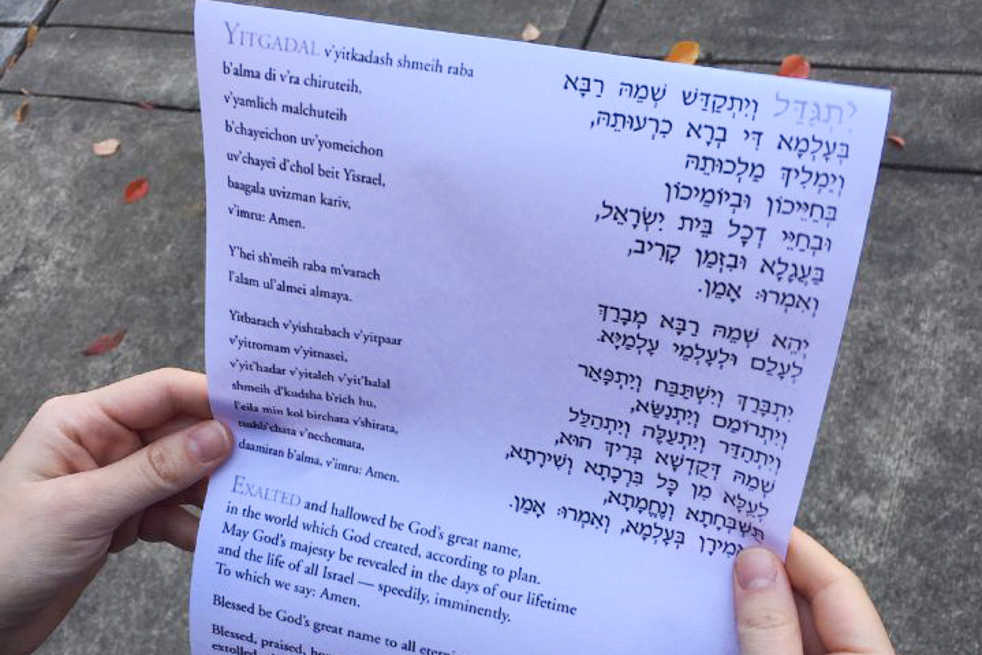On Saturday, the nation was awoken to the way in which unchecked intolerance still plagues international society. Eleven lives were lost at the hands of a prejudiced gunman who burst into a synagogue on the congregation’s day of rest with the deliberate intent of terrorizing the Jewish community in Pittsburgh.
To commemorate this event, the Tech community gathered around the Campanile on Sunday evening for a memorial service. Members of the Jewish organizations Hillel and Chabad led the community through prayers, and numerous participants shared their insight on the events that occurred in Pittsburgh. In keeping with a traditional Jewish custom, all in attendance lit their own candle as a symbol of remembrance for those who have departed.
To some, there exists no relationship between the two distant cities of Pittsburgh and Atlanta; Pittsburgh is just any other city, hundreds of miles away. But for others, Pittsburgh is right here, in thoughts and hearts. For those who hold on to the tragic events of Pittsburgh — which was the deadliest attack on the Jewish community in the entire history of the United States — moving on with daily life has been challenging.
Jessica Hertzberg, Pittsburgh native and student president of Hillel at Georgia Tech, talked about her thoughts and reactions to hearing the news of what occurred in her hometown.
“The Pittsburgh community is very strong, since we are so close-knit. It’s very close and easy to be supportive of each other,” Hertzberg said. “But it also means that everyone is connected to the sadness and the hardship.”
The Tech community has come together in response to this hardship. For example, the Muslim Student Association held a bake sale earlier in the week, from which all proceeds were donated to support the victims and their families.
In addition, Hillel itself will host a Charity Trivia night on Tuesday, Nov. 6, at 8:30 p.m. at Rocky Mountain Pizza in which proceeds from all purchases that night will go to Tree of Life Synagogue.
Community building is one tool that can be used for dealing with such sadness and hardship.
Forming meaningful relationships with others and sharing a sense of coherence with them can serve as a way to increase the well-being of all involved. In times of distress, it can provide comfort and consolation to those who grieve.
“The only thing we can do moving forward is to stand strong as a community and be there for each other. We cannot let the hatred of one individual continue to terrorize us,” said Lauren Blazofsky, director of Hillel at Tech. “The heart of the Georgia Tech Jewish Community is with the Pittsburgh community.”
It might be surprising that students at Tech have been so profoundly impacted by events that occurred so far away. Shifra Sharfstein, co-director of Chabad at Tech attributes this effect to the way in which every individual is linked ato each other and the world. Chabad is a Hasidic movement which has an on-campus chapter.
“People ask what’s my message to the local Jewish community. The truth is there is no local Jewish community, we are all one. From Pittsburgh to Jewish communities across the globe we all feel the pain together as one people,” Sharfstein said. “My message to our united community and especially all Jewish Georgia Tech students is to come together stronger than ever before. In the place of 11 let every synagogue be filled with hundreds more.”
Hannah Levy, second year EAS, is one such example of an individual who envisions the strengthening of the community. To her, this means coming together and celebrating the community’s heritage.
“I think right now what’s most important to me is being around other Jewish people. We are a strong community, but we are even stronger when we act together,” Levy said. “I don’t think that I’ve ever had more pride in my Jewish identity than I do now.”
Having pride in an identity such as a Jewish heritage is not mutually exclusive or in opposition to having pride in being American. The two are not incompatible, which is the belief shared by the Pittsburgh shooter and unfortunately many others, as evidenced by the rise in hate crimes against Jews and other minority groups such as the African-American or LGBTQ community. Such thinking is far too simple as an individual cannot be so easily defined by just one aspect of his or her character. The narrative of an individual is complex. It is not composed of singular elements, such as religion, race, gender, sexuality or nationality, but of a story that weaves all these elements and more together.
What happened in Pittsburgh is not just a problem for the small Jewish minority that calls America its home, and there is a danger in thinking that. The events of Oct. 27 violate fundamental constitutional rights. This violation severely undermines our entire system of democracy. What happened in Pittsburgh is therefore a problem for every American, just as what happened in Charleston in 2015 when racial riots and intolerance allowed for nine lives to be taken is a problem for every American. The nine victims of the Charleston attack were targeted for their race by a perpetrator who failed to understand the full narrative and qualities of these individuals. To those who think that Pittsburgh — or Charleston — is just any other city, who is to say that Atlanta is not the next city to be fractured by a violent act of intolerance? Why must it take a tragic act of violence for us to be awakened to the horror of unreigned prejudice?
Endless statistics reveal the way in which the democratic system of the United States is continuously being undermined — these numbers uncover a rise in anti-semitism, hate crimes, racial profiling and other traumatic incidents. However, these numbers are not the biggest factor at play. That is the people and their communities. People have the power to change numbers. The numbers won’t change themselves.
